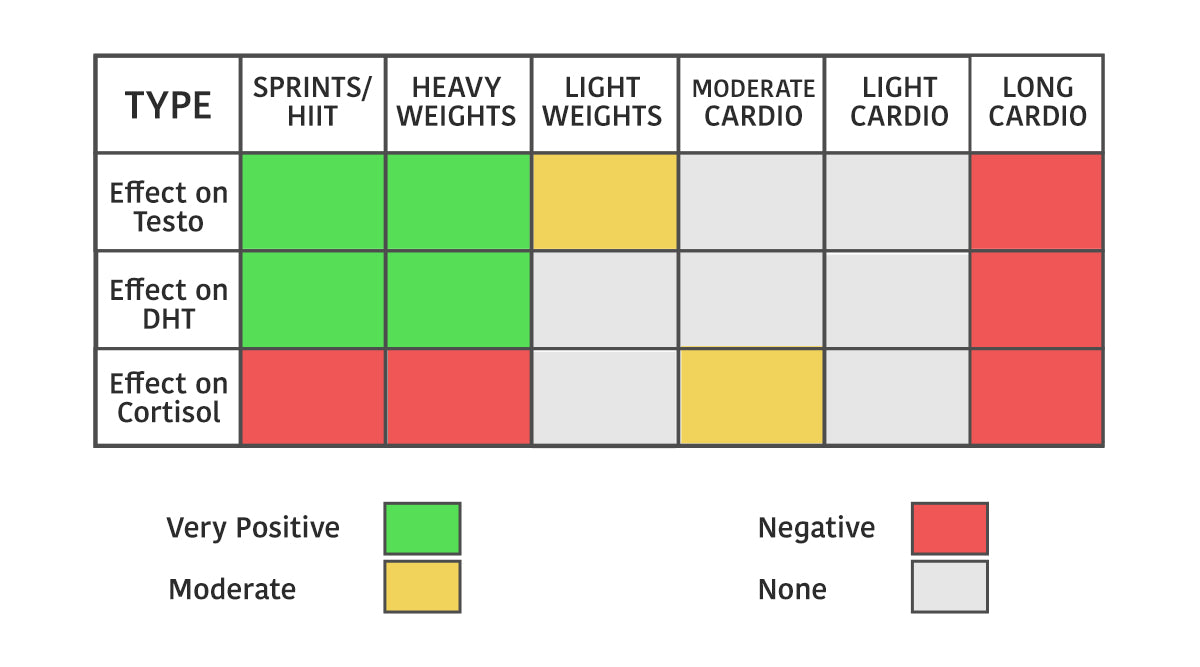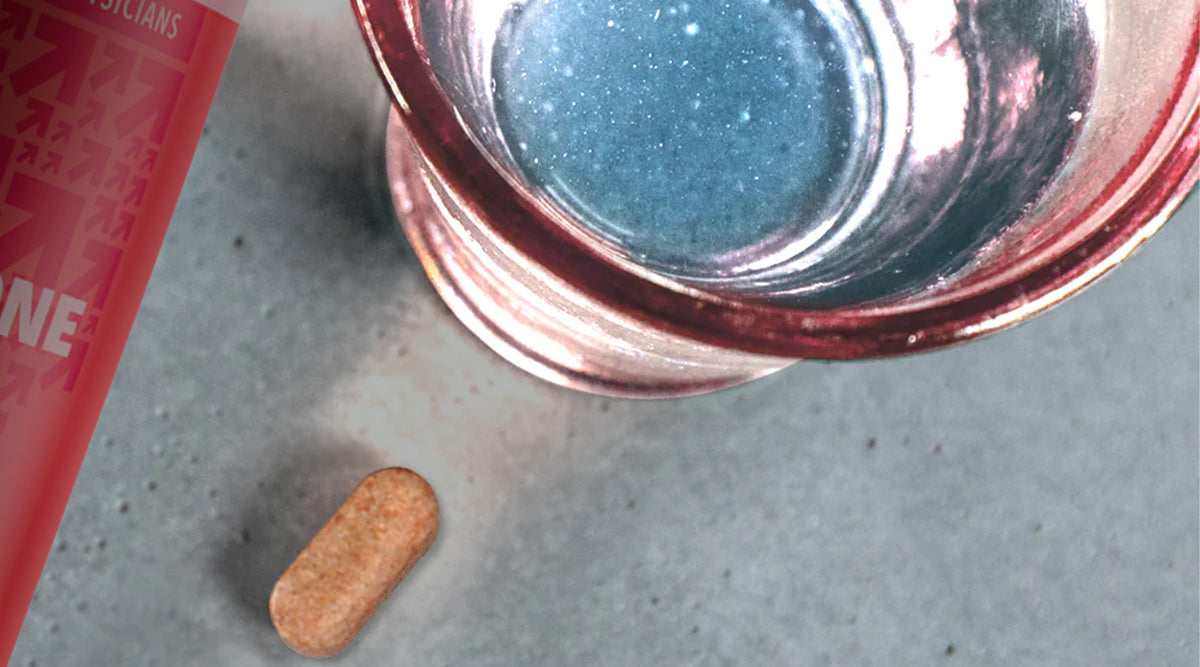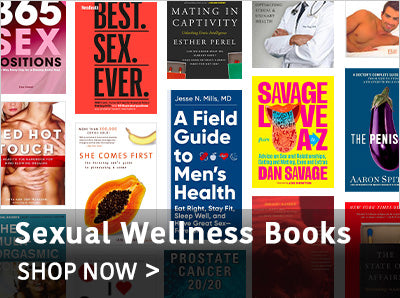Your Cart is Empty
How It Works Mobile
Health Benefits Mobile

Six Natural Ways to Boost Testosterone Levels
Six Natural Ways to Boost Testosterone Levels
8 min read
8 min read
Welcome to our comprehensive guide on harnessing the power of natural methods to boost your testosterone levels, a key to a healthy sex life, enhancing sexual health and overall vitality.
In our quest for optimal wellness, we often seek out the latest products and supplements, but the truth is that making strategic lifestyle changes can profoundly impact our hormonal balance. This blog post delves into the world of natural testosterone enhancement, offering you science-based, expert-endorsed strategies without the need for prescription drugs.
Expert Insights on Boosting Testosterone Naturally
Drawing upon the expertise of Lucas Aoun, a renowned authority in the realm of health and wellness, we're excited to share actionable advice and insights. Lucas's extensive research and accessible content on his popular YouTube channel provide a solid foundation for our recommendations. If you're aiming to elevate your testosterone levels through positive lifestyle adjustments, you're in the right place.
#1 - Excellent Sleep Boosts Testosterone Levels

Improving sexual health and performance hinges on the quality of your sleep. Adequate sleep is #1 because your body produces testosterone during deep sleep. Therefore, your testosterone levels take a massive hit if your sleep quality is low.
Get a Consistent Sleep Schedule
So, the first rule of better sleep is establishing a consistent sleep schedule - that means going to bed and waking up at about the same time each day. Then, pair it with a calming pre-bed routine. The 60 minutes before I sleep each night are almost identical each day, signaling to my body that it's time to shut down. I advise you to do the same!
Furthermore, it's crucial to refrain from eating food, drinking caffeine, or consuming alcohol within at least two hours of bedtime. Each interferes with your sleep in different ways.
Be Mindful of Artificial Light From Screens
Also, minimize screen time before bed since the light from the screen can throw off your natural sleep/wake cycle, which is highly dependent on light/dark signals from the environment. So, if you have to use screens, consider using blue blocker glasses to reduce blue light exposure in the hours leading up to sleep.
Keep It Cool in the Bedroom
Remember that we sleep best between 60 and 68 degrees Fahrenheit (15.6 and 20 degrees Celsius), so temperature regulation in your bedroom is essential.
Since your testicles perform better when they are cool, and most of your testosterone is produced when you sleep, dropping the temperature of your testicles right before bedtime is an effective method to increase nighttime hormone production.
Cooling Your Testicles: Zero Cost Testosterone Therapy
That's why part of my wind-down routine is always to cool down my testicles with a JetPack, but if you don't have one, a bag of frozen peas is an adequate substitute.
Another helpful, low-cost tool is a weighted blanket. My wife and I each have one, and there's no doubt that we sleep better when using it.
Sleep Hacks Offer Many Ways to Increase Testosterone
The landscape of sleep tech has taken a big leap in the last ten years. Lucas has some of his top pics on his site, Boost Your Biology, and I encourage you to check them out if you'd like to learn more.
Nevertheless, these simple yet effective strategies are easy to perform - and once you get into the routine, they will become ingrained habits that feel like second nature.
So, please take this advice seriously - nothing pays greater health dividends than excellent sleep!
#2 - Foods that Boost Testosterone Levels Naturally

Elevating testosterone levels naturally through diet is a fundamental component of enhancing sexual health and overall vitality.
A Nutritious Diet Boosts Energy Levels and Muscle Development
Focusing on nutrient-dense foods, such as lean meats, healthy fats, fruits, and vegetables, lays the foundation for hormonal balance and optimal health. These food groups provide the essential nutrients your body needs to function at its best, including testosterone production support.
Then, to take it a step further, incorporating foods rich in zinc, vitamin D, and omega-3 fatty acids is vital to targeting testosterone enhancement specifically.
Zinc, Vitamin D, & Omega-3s Support Healthy Testosterone Levels
Zinc is found in oysters, beef, and spinach, while vitamin D can be obtained from fatty fish, egg yolks, and fortified foods. Omega-3 fatty acids, prevalent in fish like salmon, mackerel, flaxseeds, and walnuts, are crucial for overall hormonal health. On the other hand, it's important to limit the intake of processed foods, sugar, and alcohol, as these can detrimentally affect hormone production levels.
By making these dietary adjustments, you're supporting your testosterone levels and contributing to a healthier lifestyle that benefits sexual performance and general well-being.
#3 - Exercises that Boost Testosterone Levels Naturally
When it comes to boosting testosterone levels and enhancing sexual health, it's essential to understand that not all exercise is created equal.
A strategic approach incorporating a mix of strength training, high-intensity interval training (HIIT), and cardiovascular conditioning is critical for effectively increasing testosterone levels.

Heavy Weight Lifting, HIIT, & Intense Cardio Are Most Effective
In particular, strength training exercises that involve large muscle groups - such as squats, deadlifts, and bench presses - stand out for their ability to significantly stimulate testosterone production and increase muscle mass and development. These compound weight-lifting movements are highly effective in promoting muscle growth and bone density, which, in turn, naturally boosts testosterone levels.
However, a healthy balance is crucial. While exercise can positively impact testosterone levels, too much exercise can lead to the opposite effect, decreasing daytime testosterone levels and hindering overall performance.
Build Muscle Mass with a Well-Rounded Exercise Routine
This consideration highlights the importance of a well-rounded exercise regimen with adequate recovery time. Overtraining can elevate cortisol, a stress hormone, which may negatively affect testosterone levels.
Therefore, embracing a well-balanced diet and exercise plan that optimizes hormone levels without pushing the body into a state of stress is vital
The Cornerstones of a Healthy Lifestyle to Maintain Healthy Testosterone Levels
These first three are the cornerstones of a healthy lifestyle and high natural T levels. If you get them right, you'll be better off than 90% of the guys out there.
These final three lifestyle habits will give you that remaining 10% and, combined with the first three, will place you among the healthiest men.
#4 - Manage Stress to Support Testosterone Levels

Managing stress effectively plays a crucial role in enhancing testosterone levels and improving sexual health. Chronic stress leads to elevated cortisol levels, which can significantly inhibit testosterone production.
Therefore, incorporating stress-reduction techniques into your daily routine is beneficial for mental well-being and essential for hormonal balance.
Proven Stress Reduction Techniques
Mindfulness meditation, deep breathing exercises, and yoga can lower stress and increase testosterone levels naturally. These activities work by calming the mind, reducing cortisol, and fostering an environment within the body that supports testosterone production.
Beyond structured practices, prioritizing activities that naturally promote relaxation and joy is crucial. These activities can significantly reduce stress, whether in nature, engaging in a favorite hobby, or simply taking moments throughout the day to pause and breathe. By actively managing stress through these techniques, you're not only protecting your mental health but also creating the optimal conditions for maintaining healthy testosterone levels, enhancing both your sexual health and overall quality of life.
#5 - Optimize Your Environment
Optimizing your environment is a crucial strategy in supporting normal testosterone levels and bolstering sexual health. One fundamental aspect of environmental optimization involves maximizing exposure to natural sunlight, especially in the morning.
This practice helps regulate your circadian rhythms, enhancing mood and potentially boosting testosterone production by aligning your body's natural hormonal cycles with the environment. Sunlight exposure also plays a crucial role in vitamin D synthesis, a nutrient essential for maintaining optimal testosterone levels.

Minimize Artificial Light at Night
In contrast, minimizing exposure to artificial light at night is crucial for preserving sleep quality. As stated in Part 1, the blue light emitted from electronic devices can disrupt your sleep cycle, impairing the deep sleep stages when testosterone production peaks.
In my home, we use automation with an AppleHome Kit and smart lights to turn all the lights dark red at a fixed time each night. The red light environment gives visibility but does not interfere with the sleep cycle.
Likewise, reducing screen time in the evening and using blue light filters contributes to better sleep and hormonal balance.
Red Light Increases Testosterone Levels Naturally
Red light therapy, commonly used for skin treatments and blood flow, can also boost testosterone by targeting the red light directly to your testicles. Our Optimus Red Groin Cup, designed specifically for this purpose, has yielded excellent results for many of our members. I use mine nightly before using my Jetpack.
Reduce EMFs and Toxins
Another aspect of environmental optimization is reducing exposure to environmental toxins and electromagnetic fields (EMFs). Toxins and EMFs can disrupt endocrine function, potentially affecting testosterone levels. Utilizing EMF-blocking products and ensuring good indoor air quality through air purifiers or natural ventilation can mitigate these risks.
By making these adjustments to your environment, you can create a setting that supports not only your hormonal health but also your overall well-being, leading to improvements in sexual health and performance.
#6 - Try Supplements That Boost Testosterone

In the pursuit of enhancing testosterone levels and improving sexual health, integrating specific testosterone supplements into your regimen is not free. Still, it can be a cost-effective strategy, especially when compared to testosterone replacement therapy (TRT).
Nutrient Deficiency Can Lead to Low Testosterone Levels
Research has proven that magnesium, zinc, vitamin D, and ashwagandha are effective testosterone supplements. Furthermore, the essential minerals magnesium and zinc play critical roles in numerous bodily processes, including hormone regulation. Vitamin D, often referred to as the "sunshine vitamin," is crucial for maintaining optimal testosterone levels, especially in individuals with limited exposure to sunlight.
Magnesium, Zinc, Vitamin D, & Ashwagandha Increase Testosterone Levels
Ashwagandha, a powerful adaptogen, is not contained in everyday foods but has been shown to reduce stress and potentially increase testosterone levels by lowering the hormone cortisol. This stress hormone negatively impacts testosterone production.
However, it's essential to consider the timing of supplement intake to maximize their effectiveness. For instance, taking magnesium before bed can enhance sleep quality, indirectly supporting testosterone production during sleep.
Zinc and vitamin D may be more effectively absorbed when taken with meals.
Ashwagandha's stress-reducing effects can be beneficial when taken during periods of high stress or at the beginning and end of the day.
So carefully timing your supplement intake ensures that you're absorbing these nutrients effectively and leveraging their benefits when they can most influence your testosterone levels and overall health.
Recap of All Six Lifestyle Changes

Our exploration of natural strategies for boosting testosterone underscores the significant role lifestyle changes play in hormonal health. We've mapped out a route that integrates restorative sleep, a nutrient-rich diet, effective exercise, stress management, environmental adjustments, and smart supplementation into a holistic strategy for addressing testosterone deficiency.
These lifestyle modifications promote a sustainable approach to enhancing sexual health and overall well-being, rooted in natural and lifestyle-based methods. Committing to these changes can lead to a more vibrant and healthier life.
For any questions or further guidance on male sexual health and performance, feel free to reach out to us or visit our collection of products that support healthy testosterone levels. Let's embark on this journey to better health together!
Read These Next

Natural Ways For Men To Amplify Sex Life And Libido
8 min read
Healthy sex life and sex drive go hand in hand. So while sometimes the desire for sex can feel constant, it's normal for it to go up and down over time. But what to do when your libido flatlines? The good news is that you can increase libido naturally without resorting to drastic measures.

The Ultimate Guide - How to Last Longer in Bed
20 min read
There is a wide range of reasons why you may want to increase your sexual endurance. We've explained the most common issues and how to treat and overcome them in this ultimate guide to lasting longer in bed.

Red Light Therapy for Your Testicles - Does it Boost Testosterone?
8 min read
Testosterone contributes to sex drive, energy, and sperm production and is the primary sex hormone in males, so maintaining healthy T-levels is crucial. But can red light therapy help solve the problem of low T?

























































